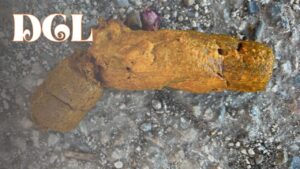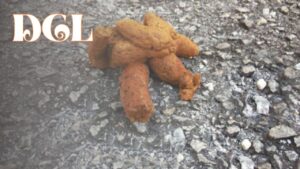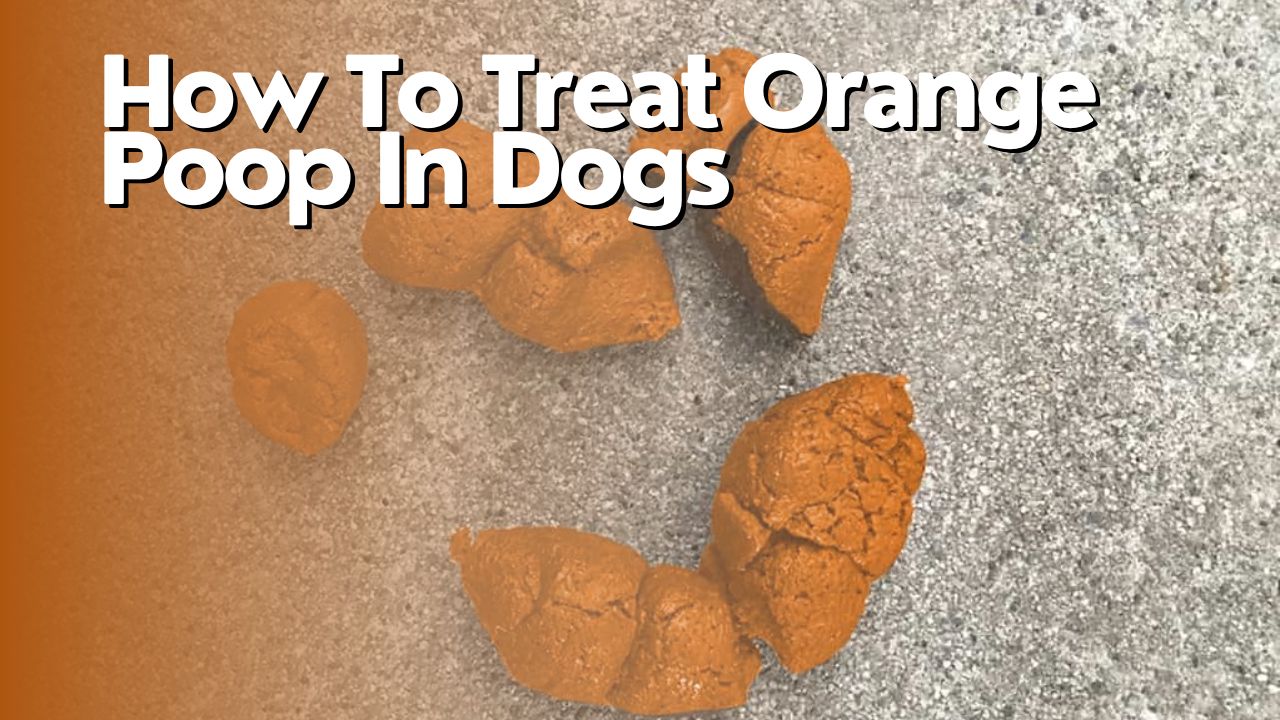Hey there! If you’re a dog owner who’s noticed your furry friend has been having orange poop, you’ve come to the right place. In this article, I’ll be sharing some helpful tips on how to treat this issue and get your pup back to normal.
We’ll dive into the potential causes, the importance of consulting with a veterinarian, conducting diagnostic tests, implementing treatment options, and maintaining a healthy diet.
So let’s get started and help your dog feel better ASAP!
Understand the Potential Causes of Orange Poop in Dogs
The first step in understanding why dogs may have orange poop is to identify the potential causes.
There are several factors that can contribute to this unusual color in their stool. One possible cause is diet. If your dog has recently consumed foods high in beta-carotene, such as carrots or sweet potatoes, it can result in orange-colored poop.
Another factor to consider is the presence of blood in the stool. Blood that has been partially digested can give the poop an orange hue. This could be a sign of a more serious underlying condition, such as gastrointestinal bleeding or liver disease.
Infections, such as viral or bacterial gastroenteritis, can also lead to changes in stool color. Additionally, certain medications or supplements that your dog may be taking could be the culprit.
If you notice your dog consistently having orange poop, it is important to consult with your veterinarian to determine the exact cause and develop an appropriate treatment plan. Remember, any sudden or persistent changes in your dog’s poop should never be ignored, as it may indicate a potential health issue.

Consult with a Veterinarian
To address the issue, you should consult with a vet. When it comes to your furry friend’s health, it’s always best to seek professional advice.
A veterinarian can provide valuable insight into why your dog may be experiencing orange poop and recommend the appropriate treatment. They will examine your dog and ask questions about their diet, recent changes in routine, and any other symptoms they may be experiencing. This thorough evaluation will help the vet determine the underlying cause of the orange poop.
It could be due to dietary factors, such as consuming foods high in beta-carotene or artificial coloring. Infections or inflammation in the gastrointestinal tract can also lead to changes in stool color. Depending on the diagnosis, the vet may recommend dietary modifications, medication, or further tests to rule out any serious conditions.
Remember, a veterinarian is the best person to provide accurate advice tailored to your dog’s specific needs. Don’t hesitate to schedule an appointment and ensure your furry friend receives the proper care they deserve.
Conduct Diagnostic Tests
If your furry friend is experiencing changes in their stool color, it may be beneficial to consult a veterinarian and consider conducting diagnostic tests. When it comes to orange poop in dogs, it can be a sign of an underlying health issue that needs to be addressed. Diagnostic tests play a crucial role in determining the cause of this abnormal stool color.
One of the first tests that a veterinarian may recommend is a fecal examination. This test helps identify any parasites or infections that could be causing the orange color. Additionally, blood tests may be performed to check for any abnormalities in the dog’s liver or pancreas, which can also affect stool color.
In some cases, the veterinarian may suggest further imaging tests, such as X-rays or ultrasounds. These tests can provide a more detailed look at the dog’s internal organs and help identify any structural abnormalities or blockages.
It is important to remember that these diagnostic tests are essential in identifying the underlying cause of orange poop in dogs. Once the cause is determined, the veterinarian can develop an appropriate treatment plan to address the issue and help restore normal stool color.
So, if you notice your dog’s poop has turned orange, don’t hesitate to consult with a veterinarian and discuss the possibility of conducting diagnostic tests.
Implement Treatment Options
When it comes to treating orange poop in dogs, there are several treatment options that can be implemented.
First, dietary changes and fiber supplements can help regulate the digestive system and improve stool consistency.
In addition, medications may be prescribed to address any infections or inflammation that may be causing the orange color.
Finally, in more serious cases, surgery may be necessary to address underlying conditions that are affecting the dog’s gastrointestinal health.
Dietary Changes and Fiber Supplements
Although dietary changes and fiber supplements can be effective, it’s important to consult with a veterinarian before making any adjustments. They can provide guidance and ensure that the chosen approach is appropriate for your dog’s specific needs.
When it comes to dietary changes, there are a few options to consider:
- Switching to a high-quality, easily digestible dog food
- Adding fiber-rich foods like pumpkin or sweet potatoes to their meals
- Incorporating probiotics to promote a healthy gut
- Increasing water intake to aid digestion
- Gradually introducing fiber supplements like psyllium husk or wheat bran
By implementing these dietary changes and incorporating fiber supplements, you can help regulate your dog’s bowel movements and potentially alleviate the issue of orange poop. Remember, always consult with a veterinarian to determine the best course of action for your furry friend.
Medications for Infections or Inflammation
One option to address infections or inflammation is to consider medication prescribed by a veterinarian. If your dog’s orange poop is caused by an infection or inflammation in their digestive system, medications can help alleviate the symptoms and promote healing.
Antibiotics may be prescribed to treat bacterial infections, while anti-inflammatory drugs can help reduce inflammation and ease discomfort. It’s important to follow the veterinarian’s instructions regarding dosage and duration of medication.
Additionally, it’s crucial to monitor your dog’s response to the medication and report any side effects or concerns to the veterinarian. Remember, medication should always be used under the guidance of a professional to ensure the safety and well-being of your furry friend.
Surgery for Serious Conditions
If medication is not effective or the condition is severe, surgery may be necessary to address serious conditions.
In some cases, orange poop in dogs can be a symptom of a serious underlying condition that requires surgical intervention. For example, if the orange poop is caused by a blockage in the dog’s digestive system, surgery may be needed to remove the obstruction and restore normal bowel function.
Additionally, if the orange poop is a result of a tumor or growth in the dog’s intestines, surgery may be required to remove the mass and prevent further complications.
It is important to consult with a veterinarian to determine if surgery is the appropriate course of action and to discuss the potential risks and benefits of the procedure.
Monitor and Maintain a Healthy Diet
When it comes to monitoring and maintaining a healthy diet for my dog, there are a few key points I always keep in mind.
First and foremost, regular vet check-ups are crucial to ensure my dog’s overall health and well-being.
Secondly, proper hydration is essential, so I always make sure my dog has access to fresh water at all times.
Lastly, exercise plays a vital role in maintaining a healthy diet, so I make sure my dog gets regular exercise to keep them fit and active.

Regular Vet Check-ups
Regular vet check-ups are important for monitoring your dog’s stool color and addressing any concerns regarding orange poop. It’s crucial to have a professional assess the situation and rule out any underlying health issues. During these check-ups, the vet will conduct a thorough examination, which may include a fecal analysis to determine the cause of the orange poop. They can provide guidance on dietary adjustments, if necessary, and recommend any needed supplements to ensure your dog’s digestive system is functioning properly. Additionally, they may suggest specific tests or treatments based on their findings. Remember, prevention is key, so don’t skip those regular vet appointments! Your furry friend’s health and well-being depend on it.
Regular vet check-ups can catch any health issues early on.
Having a professional assess the situation can provide peace of mind.
The vet can offer tailored advice and treatments to maintain your dog’s overall health.
Proper Hydration and Exercise
Make sure you stay properly hydrated and get enough exercise to keep your body healthy. Hydration is essential for maintaining good digestion and preventing issues like orange poop in dogs. As a dog owner, it’s crucial to provide clean and fresh water for your furry friend at all times. Additionally, regular exercise helps stimulate the digestive system and promotes overall well-being. A combination of both hydration and exercise can help regulate bowel movements and prevent any abnormalities, including orange poop.
To emphasize the importance of hydration and exercise, here’s an imagery-filled table:
| Hydration | Exercise |
|---|---|
| – Drink plenty of water | – Regular walks or runs |
| – Provide fresh water daily | – Engage in playtime activities |
| – Monitor water intake | – Encourage active play |
| – Offer water during outdoor activities | – Consider dog-friendly sports |
| – Check for signs of dehydration | – Gradually increase exercise intensity |
By following these guidelines, you can ensure your dog stays properly hydrated and active, reducing the chances of orange poop and promoting overall health.
Frequently Asked Questions
Can orange poop in dogs be a sign of a serious health condition?
Orange poop in dogs can be a sign of a serious health condition. It could indicate issues like liver or gallbladder problems, food intolerances, or infections. Consulting a veterinarian is important for proper diagnosis and treatment.
Is it normal for a dog’s poop to change color occasionally?
Yes, it is normal for a dog’s poop to change color occasionally. Factors like diet, medications, and stress can cause variations. However, if the color persists or is accompanied by other concerning symptoms, it’s important to consult a veterinarian.
Can certain medications or supplements cause orange poop in dogs?
Yes, certain medications or supplements can cause orange poop in dogs. It’s important to consult with a veterinarian to determine the cause and appropriate treatment for your dog’s orange poop.
How long does it take for the dog’s poop to return to normal after treatment?
It usually takes a few days for the dog’s poop to return to normal after treatment.
Are there any home remedies or over-the-counter products that can help with orange poop in dogs?
There are no home remedies or over-the-counter products that I know of to specifically treat orange poop in dogs. It’s best to consult a veterinarian for proper diagnosis and treatment options.
Conclusion
In conclusion, treating orange poop in dogs requires understanding the potential causes and consulting with a veterinarian. It is important to seek professional help to determine the underlying cause and provide appropriate treatment.
Conducting diagnostic tests is also necessary to identify any underlying health issues. Once the cause is identified, implementing treatment options can help alleviate the symptoms and restore normal bowel movements.
In addition to treatment, monitoring and maintaining a healthy diet is crucial for long-term management. This includes feeding a balanced and nutritious diet that is suitable for your dog’s specific needs.
By following these steps, we can ensure the well-being of our furry friends and help them live a happy and healthy life.


